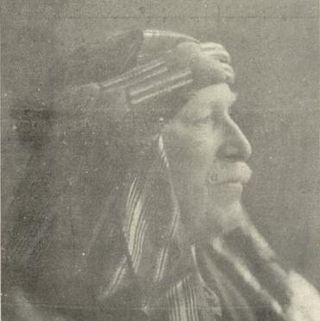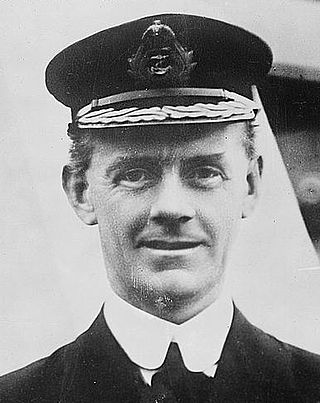Related Research Articles

Earl of Iddesleigh, in the County of Devon, is a title in the Peerage of the United Kingdom. It was created in 1885 for the Conservative politician Sir Stafford Northcote, 8th Baronet, of Pynes in the parish of Upton Pyne near Exeter in Devon and lord of the manor of Iddesleigh, 28 miles north-west of Pynes. He served as President of the Board of Trade, Secretary of State for India, Chancellor of the Exchequer, First Lord of the Treasury and Foreign Secretary and was Joint Leader of the Conservative Party from 1881 to 1885. Northcote was made Viscount St Cyres, of Newton Saint Cyres in the County of Devon, at the same time he was given the earldom. This title is also in the Peerage of the United Kingdom.

Earl St Aldwyn, of Coln St Aldwyn in the County of Gloucester, is a title in the Peerage of the United Kingdom. It was created in 1915 for the prominent Conservative politician Michael Hicks Beach, 1st Viscount St Aldwyn, known from 1854 to 1907 as Sir Michael Hicks Beach, 9th Baronet, of Beverston. He was Chancellor of the Exchequer from 1885 to 1886 and again from 1895 to 1902. Hicks Beach had already been created Viscount St Aldwyn, of Coln St Aldwyn in the County of Gloucester, in 1906, and was made Viscount Quenington, of Quenington in the County of Gloucester, at the same time he was given the earldom. Both titles are in the Peerage of the United Kingdom. He was succeeded by his grandson, the second Earl, the son of Michael Hicks Beach, Viscount Quenington, Member of Parliament for Tewkesbury, who was killed in action in 1916. Lord St Aldwyn was also a Conservative politician and was Captain of the Honourable Corps of Gentlemen-at-Arms between 1958 and 1964 and 1970 and 1974. As of 2018 the titles are held by his eldest son, the third Earl, who succeeded in 1992.

Viscount Hill, of Hawkstone and of Hardwicke in the County of Salop, is a title in the Peerage of the United Kingdom. It was created in 1842 for General Rowland Hill. He had already been created Baron Hill, of Almaraz and of Hawkstone in the County of Salop, in 1814, with remainder to the heirs male of his body, and Baron Hill, of Almarez and of Hawkestone and Hardwicke in the County of Salop, in 1816, with remainder to the heirs male of his elder brother John Hill. The viscountcy was created with the same special remainder. On the first Viscount's death in 1842, the barony of 1814 became extinct as he had no male issue, while he was succeeded in the barony of 1816 and the Viscountcy according to the special remainders by his nephew Sir Rowland Hill, 4th Baronet. His son, the 3rd Viscount, sat as a Conservative Member of Parliament for Shropshire North. In 1875, he assumed by Royal licence the additional surname of Clegg, which was that of his maternal grandfather. He inherited financial problems from his father which led to the breakup and sale of the family estates.

Viscount St Davids, of Lydstep Haven in the County of Pembroke, is a title in the Peerage of the United Kingdom. It was created in 1918 for John Philipps, 1st Baron St Davids. The Philipps family descends from Sir John Philipps, who represented Pembrokeshire in the House of Commons. In 1621 he was created a Baronet, of Picton Castle in the County of Pembroke, in the Baronetage of England. His grandson, the third Baronet, also sat as Member of Parliament for Pembrokeshire. He was succeeded by his son, the fourth Baronet. He represented Pembroke and Haverfordwest in Parliament. His son, the fifth Baronet, sat for Haverfordwest. He was succeeded by his younger brother, the sixth Baronet. He represented Carmarthen, Petersfield and Pembrokeshire in the House of Commons.

Baron Hesketh, of Hesketh in the County Palatine of Lancaster, is a title in the Peerage of the United Kingdom. It was created in 1935 for Sir Thomas Fermor-Hesketh, 8th Baronet, who had previously briefly represented Enfield in the House of Commons as a Conservative. As of 2010 the titles are held by his grandson, the third Baron, who succeeded his father in 1955. Lord Hesketh held junior ministerial positions in the Conservative administrations of Margaret Thatcher and John Major. However, he lost his seat in the House of Lords after the House of Lords Act 1999 removed the automatic right of hereditary peers to sit in the upper chamber of Parliament.
Baron Cawley, of Prestwich in the County Palatine of Lancaster, is a title in the Peerage of the United Kingdom. It was created in 1918 for the Liberal politician Sir Frederick Cawley, 1st Baronet. He had previously represented Prestwich in the House of Commons and served as Chancellor of the Duchy of Lancaster from 1916 to 1918. Before his elevation to the peerage, Cawley had been created a baronet, of Prestwich in the County Palatine of Lancaster, in the Baronetage of the United Kingdom, in 1906. His grandson, the third Baron, notably served as Deputy Chairman of Committees in the House of Lords from 1958 to 1967. As of 2023 the titles are held by the latter's eldest son, the fourth Baron, who succeeded in 2001.

There have been two baronetcies created for persons with the surname Arthur, both in the Baronetage of the United Kingdom. As of 2014 both creations are extant.

Lord Headley, Baron Allanson and Winn, of Aghadoe in the County of Kerry, was a title in the Peerage of Ireland. It was created in 1797 for Sir George Allanson-Winn, 1st Baronet, a former Baron of the Court of the Exchequer and Member of Parliament for Ripon. He had already been created a Baronet, of Little Warley in the County of Essex, in the Baronetage of Great Britain on 14 September 1776. His son, Charles Winn-Allanson, 2nd Baron Headley, represented Ripon, Malton and Ludgershall in Parliament. In 1833 he succeeded a distant relative as 8th Baronet, of Nostel. His nephew, the third Baron, sat in the House of Lords as an Irish Representative Peer from 1868 to 1877. His son, the fourth Baron, was an Irish Representative Peer from 1883 to 1913. His cousin, Rowland Allanson-Winn, 5th Baron Headley, was a prominent convert to Islam. On the death in 1994 of the latter's younger son, Charles Allanson-Winn, 7th Baron Headley, the titles became extinct.

The Errington Baronetcy, of Ness in the County Palatine of Chester, was created in the Baronetage of the United Kingdom on 26 June 1963 for Sir Eric Errington, 1st Baronet.

There have been four baronetcies created for persons with the surname Sykes, two in the Baronetage of Great Britain and two in the Baronetage of the United Kingdom. Three of the creations are extant as of 2008.

There have been twenty one baronetcies created for persons with the surname Williams, eight in the Baronetage of England, three in the Baronetage of Great Britain and ten in the Baronetage of the United Kingdom. Only six of the creations are extant as of 2017.

The Herschel Baronetcy, of Slough in the County of Buckingham, was a title in the Baronetage of the United Kingdom. It was created on 17 July 1838 for John Herschel, son of the famous astronomer Sir William Herschel, and a well-known astronomer in his own right. The baronetcy became extinct on the death of the third baronet on 15 June 1950.

The Halsey Baronetcy, of Gaddesden in the County of Hertford, is a title in the Baronetage of the United Kingdom. It was created on 22 June 1920 for the Conservative politician Frederick Halsey. The third Baronet was a captain in the Royal Navy. The fourth Baronet is an Anglican priest and Brother of the Community of the Transfiguration, Midlothian.
There have been two baronetcies created for persons with the surname Hodge, both in the Baronetage of the United Kingdom. One creation is extant as of 2010.
Sir Rowland Frederick William Hodge, 1st Baronet was an English shipbuilder.
Sir Walter Johnston Halsey, 2nd Baronet, OBE, DL, JP, sometime DL and JP for Hertfordshire and Middlesex, and chair. Legal Insurance Co. He succeeded to the title on the death of his father in 1927.
The High Sheriff of Kerry was the British Crown's judicial representative in County Kerry, Ireland from the 16th century until 1922, when the office was abolished in the new Free State and replaced by the office of Kerry County Sheriff. The sheriff had judicial, electoral, ceremonial and administrative functions and executed High Court Writs. In 1908, an Order in Council made the Lord-Lieutenant the Sovereign's prime representative in a county and reduced the High Sheriff's precedence. However, the sheriff retained his responsibilities for the preservation of law and order in the county. The usual procedure for appointing the sheriff from 1660 onwards was that three persons were nominated at the beginning of each year from the county and the Lord Lieutenant then appointed his choice as High Sheriff for the remainder of the year. Often the other nominees were appointed as under-sheriffs. Sometimes a sheriff did not fulfil his entire term through death or other event and another sheriff was then appointed for the remainder of the year. The dates given hereunder are the dates of appointment. All addresses are in County Kerry unless stated otherwise.
Sir Frederick Rowland, 1st Baronet was Lord Mayor of London for 1949 to 1950.